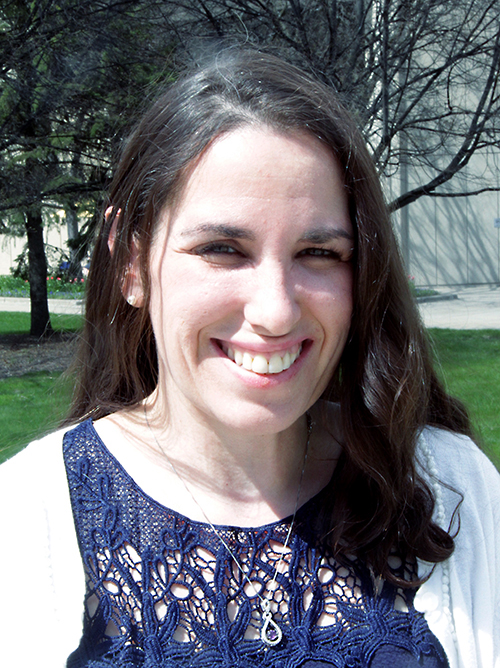Lack of confidence, embarrassment, anxiety and fear can prevent adults without a high school diploma from pursuing a GED. Washtenaw Community College is fortunate to have a powerful tool to help alleviate those concerns for students.
Marisol Warunek, an administrative assistant for the Adult Transitions GED Pathways program, is the first person most potential GED students meet at the college. It doesn’t take long to realize they’re speaking with a living billboard for conquering apprehension and capitalizing on a second chance.

Warunek
A graduate of the program herself, Warunek says the support she received from staff at WCC played a major role in her success. That’s why she is quick to share her own story with students if she believes it will help ease their concerns.
She tells them about being the victim of bullying and her decision to finally give up on school in the eighth grade, at the age of 16. She tells them about the years of shame and lying to friends and on job applications that followed.
Think you’re too old to return to school? Warunek will tell you she was 35 when she stepped back into the classroom and had to overcome a great deal of anxiety along the way. Have a child? She’ll tell you her biggest motivation was setting a good example for her son, Owen.
“I will tell a student that I graduated from the program and it was the best $30 investment I ever made in myself,” she says. “One of the biggest things that our students gain from our program is confidence. Once you pass that test, which has been a barrier to your success, you know you can do anything.”
Once again, Warunek is living proof. She graduated from the program with high honors and was chosen to speak at her class’ graduation ceremony. With new-found confidence, she enrolled at WCC and earned an associate degree in liberal arts and will pursue a business degree at Eastern Michigan University beginning next semester.
Bonnie Truhn, manager of Adult Transitions Pathways at WCC, calls Warunek “invaluable” to the program for her work and because she is a role model for students. But she is equally excited about all the success stories that start on campus.
More than a GED test-taking facility, Adult Transitions Pathways is a career program that offers alternative learning models and training opportunities to help students develop social and work-ready skills that will advance education and career potential. Truhn says many students face huge challenges – including mental health issues, homelessness, low academic skills, legal issues, and more.
It provides opportunities for students to improve academic skill levels, earn a high school equivalency certificate, get a job, and – perhaps most importantly – figure out how to balance everything in their lives while getting on a path to postsecondary success.
“We try to address the challenges and barriers that students face from the minute they walk through the door,” Truhn said. “We emphasize to students the importance of building a network of supportive people and an awareness of opportunities. This starts while students are enrolled in the program, but we continue to work with them as they transition to college, training, and jobs while they work on building a career.
“Marisol is one of the many examples of our students who have taken advantage of what we have offered and excelled.”
Warunek says serving as a student mentor in the program after her own graduation helped her continue to gain confidence, and eventually led to employment at WCC.
“In my 30 years of experience in education, primarily working with under-prepared, at-risk populations, one of the most important things that I’ve learned is that youth and adults thrive when they are engaged as leaders,” Truhn said. “(Serving as a student mentor) provides an employment and leadership development experience that helps prepare young and older students for postsecondary success, which leads to them making valued social and economic contributions to our community.”
Warunek still gets emotional about the experience, holding back tears while describing the sense of relief, excitement and pride she felt during that graduation speech and continues to feel as she moves forward toward her educational and career goals.
“For a long time, I really did not think I had what it took to pass the GED,” she says. “When I did, I knew I could do anything I set my mind to. There was not anything that I would ever let be a barrier to my success and make me feel shame like that ever again.
“Now, when I have a difficult time in a class or in life, I don’t let it define me. I conquer whatever the obstacle is with the full knowledge that I can do it.”
How to earn your GED
WCC Adult Transitions GED Pathways program classes are held at the college’s main campus in Ann Arbor and at its Harriet Street Center in Ypsilanti. Call 734-677-5006 for information about upcoming orientation sessions.
Day and evening teacher-led classes are available and include integrated computer instruction, individual tutoring, personal and academic counseling, student mentors and more. The cost is $30 and students must have a valid, government-issued identification and a Social Security number. Scholarships are available.
The program also helps students with college and career planning, counseling services, academic skills services and college transition support.
